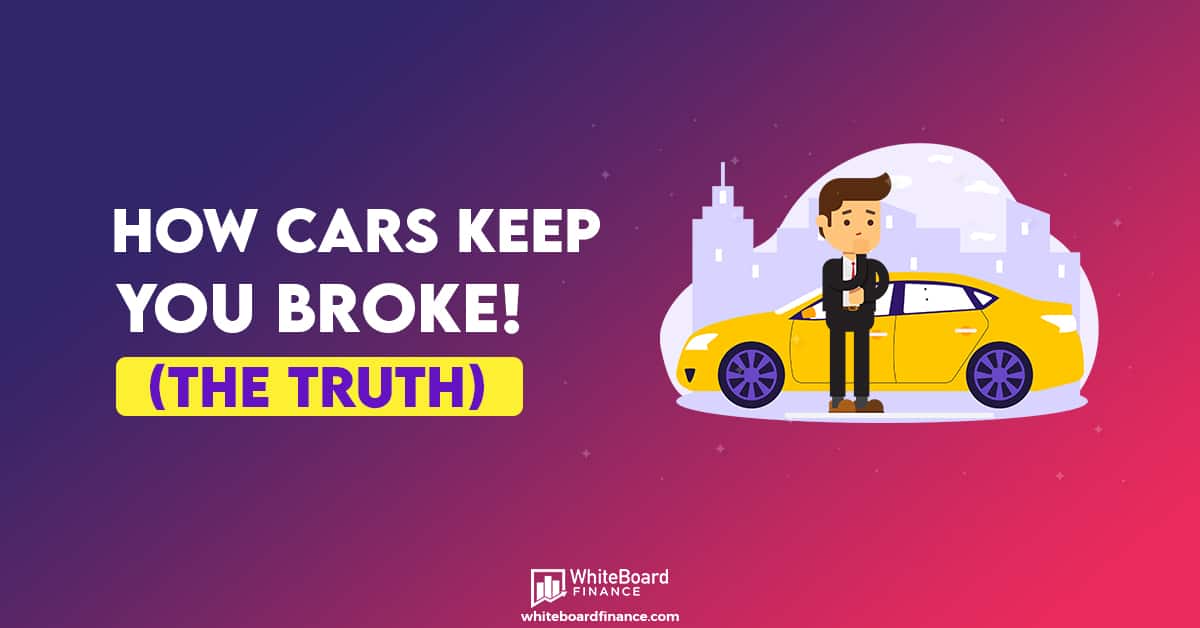Let’s get this straight: people love their cars… but why?
Almost everyone can remember their first car, the freedom and joy it brought, how much cooler it made you, and just how good it felt to get behind the wheel, hit the road, and crank up some tunes.
Along with the memories, cars are a practical tool to get people to and from work. Commuting to work is very much the norm for most working Americans, so their cars are basically their lifeline that allows them to make an income and put food on the table.
Last but not least, cars are sort of a status symbol – especially in the United States. We’ve all heard the saying “keeping up with the Joneses”. Well, low to middle income Americans going all out on a brand-new car or even a luxury vehicle is the epitome of “keeping up with the Joneses” … and you DON’T want to end up in that boat.
Let’s dive a little deeper into the economics behind the car industry and how cars keep you BROKE.
If you're a visual learner, check out my video below:
Spending Billions To Keep You Broke
In 2018, the automotive industry spent just shy of $36 Billion on marketing alone, with approximately $18 Billion spent solely on the U.S. auto market.
Those figures are only expected to grow – with anticipated marketing spend growth of 0.9% in 2019 and 2% in 2020.
Considering the global automotive market was valued at an estimated $4 Trillion in 2019, it makes sense that major auto brands continue to shell out billions in marketing dollars to get you into their dealerships.
There’s A LOT of money on the line.
3 Ways Cars Keep You Poor
Cars keep you BROKE with a combination of 3 factors.
1. Borrowing Costs
Most people cannot afford to purchase a car with all cash. Thus, most people turn to financing their vehicle purchases. This costs money in the form of interest.
For example, if your credit score is between 661 and 780, the average interest rate you could expect for a new car is 4.75%, and for a used car 6.15%. This equates to hundreds if not thousands of dollars in interest over the life of your auto loan.
Now that’s costly.
2. Depreciation
Not only are you borrowing money, your borrowing money to purchase a depreciating asset.
On average, new cars lose 63% of their value in the first 5 years of ownership. 10% of your cars value is lost immediately after you drive it off the lot of the dealership.
Talk about a losing situation.
3. Maintenance
Last, but certainly not least, when you purchase a car you must maintain it.
Things like tires, oil changes, insurance, brakes, etc… they all cost money and when something needs to be replaced, you’re on the hook for it.
BONUS: Real Life Scenario of a Car Keeping You Broke
Now that we understand the 3 different ways cars keep you broke, let's bring it all together under one real-life scenario. Buckle up.
The average monthly car payment in the United States is $551 for new vehicles, at an average term of 69 months. The average monthly car payment for used vehicles is $393 and $452 for leases.
Using the average monthly payment for a new vehicle, which is $551 over 69 months, you’d be paying a total of $38,019 in principal and interest. That isn’t including any normal maintenance costs like oil changes, tires, new brakes, and so on. Don’t forget that instant 10% drop in value once you drive off the dealerships lot. Talk about a lose-lose-lose scenario.
On the flip side, let’s say that you decided to forego that nice brand-new car, stuck to your beater, and instead took the money you would’ve spent on monthly payments and invested it into an investment vehicle that returned on average 7% per year.
The math tells us that you would’ve invested $38,019 and made $8,324 in interest on your money. This gives us a total sum of $46,344. Cha-ching!
Which deal sounds better? The numbers are pretty clear.
Let’s take it one step further. Instead of investing that $551 per month over 69 months, let's increase it to 20 years. Same return of 7%.
The result? Your investment would be worth $279,652; $132,000 of that being principal, and the other $147,652 being interest made on your money. That my friends is the power of compound interest.
Now, no investment is guaranteed. No rate of return is guaranteed. But based on over 100 years of stock market data, we can confidently say a 7% return is absolutely possible.
Final Thoughts
Don’t get me wrong, cars a necessity of modern-day life. You use them to commute to and from the office so you can work and provide for your family. You use them for trips and other activities. But before you go ahead and go broke splurging on that nice brand-new vehicle, crunch the numbers and determine what you can reasonably afford.
Not sure how much car you can afford? No worries! I have a blog article that helps you figure out how much you can afford so you don’t go broke when deciding to buy a car.
You can check out the 20/4/10 rule to help you understand exactly how much can you can afford for your next car purchase.






